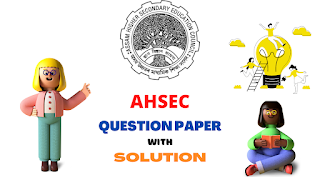AHSEC| CLASS 11| BUSINESS STUDIES| SOLVED PAPER - 2019| H.S. 1ST YEAR
2019
BUSINESS STUDIES
(Commerce)
(Theory)
Full Marks: 80
Pass Marks: 24
Time: 3 hours
The figures in the margin indicate full marks for the questions
1. Answer the following questions: 1×8=8
(a) What are the different types of business activities?
Ans:- There are three types of business activities:-
(i) Financial activities
(ii) Investment activities
(iii) Operating activities
(b) Business of Hindu Undivided Family (HUF)are controlled and managed by one person known as karta.
(c) Which organisation is formed by state and central legislation?
Ans: Public Sector Organisation.
(d) Name two different types of bank.
Ans: Commercial Bank and Investment Bank.
(e) What does 'e' stand for in e-business?
Ans: Electronic Business.
(f) State the full-form of BPO.
Ans: Business Process Outsourcing (BPO).
(g) What is the status of debenture-holders?
Ans: Debenture-holders are creditors of the company.
(h) A retailer is the link between the final user and the wholesaler.
2. Explain the concept of Business. 2
Ans:- Business is an economic activity that involves the exchange, buying, selling or production of goods and services for the purpose of earning profits and satisfying the needs of customers. Businesses can be profit-making or non-profit organizations that work to earn profits or achieve a social purpose.
3. Give two distinctive features of a sole-proprietorship business. 2
Ans: (i) Lack of Legal Formalities (ii) Risk of Profit.
4. What is mean by multinational corporation? 2
Ans:- A multinational corporation is a corporate organization that owns or controls the production of goods or services in at least one country other than its home country. Very big multinational companies have budgets.
5. Define a cottage industry. 2
Ans:- By cottage industries we mean those industries and crafts which are generally done in the homes of artisans. He is usually assisted in his work by his family members. It may be a full-time job as if he is not an artisan but a farmer, he may be doing it as a side business in his spare time. In cottage industries no electricity is used and the tools and equipment used are simple. Examples of cottage industries are hand spinning, handloom weaving, toy making, rope making, carpet weaving, wood working etc.
6. What is meant by promotion of a Company? 2
Ans:- Promotion is the first step in forming a company. A promoter takes the initiative to start a company. He imagines the future and plans accordingly. He looks for business opportunities and possibilities. As soon as he realizes the business possibilities in any field, he starts working. He brings a company into existence and develops profitable investment opportunities. He is an expert in his field.
7. Discuss three factors responsible for environmental pollution. 2
Ans:- Three factors are responsible for environmental pollution:-
(i) Air Pollution: Air pollution is the result of a combination of factors that reduce the air quality and are responsible for creating holes in the ozone layers thereby threatening human life. The main reason for this is that carbon monoxide released from automobile exhaust and other chemicals released from manufacturing plants pollute the air.
(ii) Water Pollution: Commercial enterprises are dumping waste and chemicals into rivers, streams and lakes, causing water pollution, posing a serious threat to aquatic and human life.
(iii) Land Pollution: Throwing toxic waste on land causes land pollution. This degrades the quality of the land, making it unsuitable for agriculture or plantations.
8. Discuss the advantages of preference shares. 2
Ans:- The advantages of preference shares are:-
(i) Preference shares provide a fixed rate of return and a reasonable steady income as security of investment.
(ii) Preference shares are useful for investors who want a fixed rate of return with comparatively less risk;
(iii) It does not affect the control of equity shareholders over management because preference shareholders do not have voting rights.
9. What are the objectives of WTO? 2
Ans:- The objectives of WTO are as follows:-
(i) To ensure reduction of tariffs and other trade barriers imposed by various countries;
(ii) To engage in activities that improve standards of living, create employment, increase income and effective demand and facilitate higher production and trade;
(iii) To facilitate optimal use of the world's resources for sustainable development;
(iv) To promote an integrated, more viable and sustainable trading system.
10. State any three differences between E-business and traditional business.3
Ans:- There are three differences between e-business and traditional business:-
(i) Traditional business is difficult to set up, but e-business is simple.
(ii) Traditional business requires physical pressure and e-business does not require it.
(iii) Cost of selling traditional business is high and cost of establishment is low in case of e-business as there is no need of physical facilities.
11. Discuss three limitations of E-business.
(Buy E-Books to read complete solutions)
DOWNLOAD [PAGE LINK:-CLICK HERE]
***
BUSINESS STUDIES SOLVED PAPERS PAGE LINK - Click here
BUY E-BOOK (PDF FILE)
[TO SEE FULL SOLUTION]
(Chapter wise Notes, Exam Question Papers solved, MCQ solved) [ARTS, COMMERCE, SCIENCE]
|
DOWNLOAD PAGE LINK:-CLICK HERE |
AHSEC PAGE LINK - CLICK HERE
Also Read:

